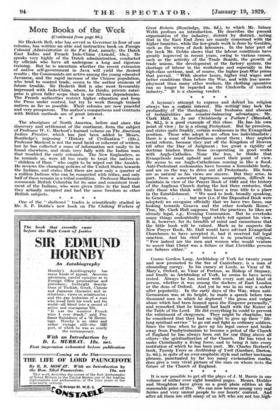A layman's attempt to express and defend his religion always
has a,eaten' interest." His -writing--may lack the profundity of the theologian,. but freshness and absence of techniCalities are countr;-balancing advantages.. Mr. Clark Half,- in Is. our Christianity is Failure ? .(Marshall, 3s. 6d.),_ is a good example of this class. He has -his own point of _view.; he is a strong. Protestant. But he perceives, and states quite frankly, certain weaknesses in the Evangelical position. Those who adopt it are often too individualistic ; there is a want of brotherliness about them ; they neglect 'social reform, because they put off the -Kingdom of Heaven till after the- Day Of Judgment ; too great a rigidity of doctrine hinders, them from co-operating in good works with Anglo-Catholics. None the less, he thinks that Evangelicals must uphold and assert their point of view. He seems to see Anglo-Catholicism coming in like a flood. Anti-Protestant ecclesiastics have become a formidable body, and are on the way to drive Out all Protestants. His fears are as natural as his views are sincere. But they arise, in part, from a somewhat ingenuous assumption, difficult to maintain in view of the Prayer Book of 1662 and the history of the Anglican Church during the last three centuries, that only those who think with him have a true title to a place in the Establishment. " We used to look, broadly speaking, to Geneva, . . . but now (i.e. if the Deposited Book were adopted) we recognize officially that we have two faces, one looking towards Geneva and the other towards Rome." True, Mr. Clark Hall supposes that the practices he likes are already legal, e.g., Evening Communion. But he overlooks many things undoubtedly legal which tell against his view. It is, however, for its breadth of mind and earnestness that the little book will be valued. Much as he suspects the New Prayer Book, Mr. Hall would have advised Evangelical Churchmen to have accepted it, had it received full legal sanction. And his chief interest is in practical religion. " Few indeed are the men and women who would venture to assert that Christ was a failure or that Christlike persons are failures either."
* * * *






































 Previous page
Previous page